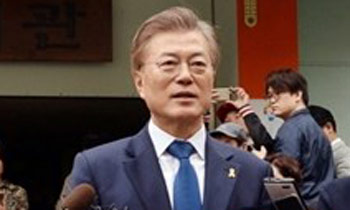Reply To:
Name - Reply Comment

 Liberal politician Moon Jae-in won South Korea's presidential election on Tuesday, exit polls showed, an expected victory that would end nearly a decade of conservative rule and bring a more conciliatory approach toward North Korea.
Liberal politician Moon Jae-in won South Korea's presidential election on Tuesday, exit polls showed, an expected victory that would end nearly a decade of conservative rule and bring a more conciliatory approach toward North Korea.
Moon, 64, is expected to beat conservative challenger, former prosecutor Hong Joon-pyo, by 41.4 percent to 23.3 percent of the votes, exit polls conducted jointly by three network television stations showed.
A decisive win by Moon would end months of political turmoil stemming from a parliamentary vote in December to impeach former President Park Geun-hye over an extensive corruption scandal.
The Constitutional Court upheld her impeachment in March, making her the first democratically elected leader to be removed from office and triggering a snap election to choose her successor.
Wearing a dark blue suit with a blue tie, Moon was seen shaking hands with supporters and officials and smiling on his way to his Democratic Party building on Tuesday evening, TV footage shows.
He told his party he would push for reform and national unity if he was confirmed as the next president.
A Gallup Korea poll last week showed Moon had 38 percent support in a field of 13 candidates.
Moon is expected to be sworn in on Wednesday after the National Election Commision releases the official result. Most candidates including Moon have said they would skip a lavish inauguration ceremony and start work straight away.
The new leader is expected to quickly name a prime minister, who will need parliamentary approval, and main cabinet positions, including national security and finance ministers, which do not need parliamentary confirmation.
Moon's victory was bolstered by strong support from younger people, the majority of whom voted for him, according to the exit polls.
Many of his supporters participated in big, peaceful weekend rallies over the last few months of 2016 and early this year, demanding Park step down.
Moon, whose campaign promises include a "National Interest First" policy, has struck a chord with people who want the country to stand up to powerful allies and neighbors.
He wrote in a book published in January South Korea should learn to say "no to America".
Moon favors dialogue with North Korea to ease rising tension over its accelerating nuclear and missile program. He also wants to reform powerful family-run conglomerates, such as Samsung and Hyundai, and boost fiscal spending to create jobs.
Moon, who narrowly lost to Park in the last presidential election, in 2012, has criticized the two former conservative governments for failing to stop North Korea's weapons development. He advocates a two-track policy of dialogue while maintaining pressure and sanctions to encourage change.
The election is being closely watched by allies and neighbors at a time of high tension over North Korea's accelerating development of weapons since it conducted its fourth nuclear test in January last year. It conducted a fifth test in September and is believed ready for another.
Moon said in a YouTube live stream on Tuesday South Korea should take on a more active diplomatic role to curb North Korea's nuclear threat and not watch idly as the United States and China talk to each other.
His election could complicate the deployment of a U.S. Terminal High Altitude Area Defence (THAAD) anti-missile system, which the former Seoul government and the U.S. military agreed last year to deploy in South Korea as defense against North Korean missiles.
Moon, a human rights lawyer and former student activist, has said the next administration should have the final say on whether to deploy the system.
Many conservatives worry he will revert to a former liberal governments' policy of promoting economic ties with North Korea, which they say helped fund its weapons development, while undermining the all-important alliance with Washington. (Reuters)